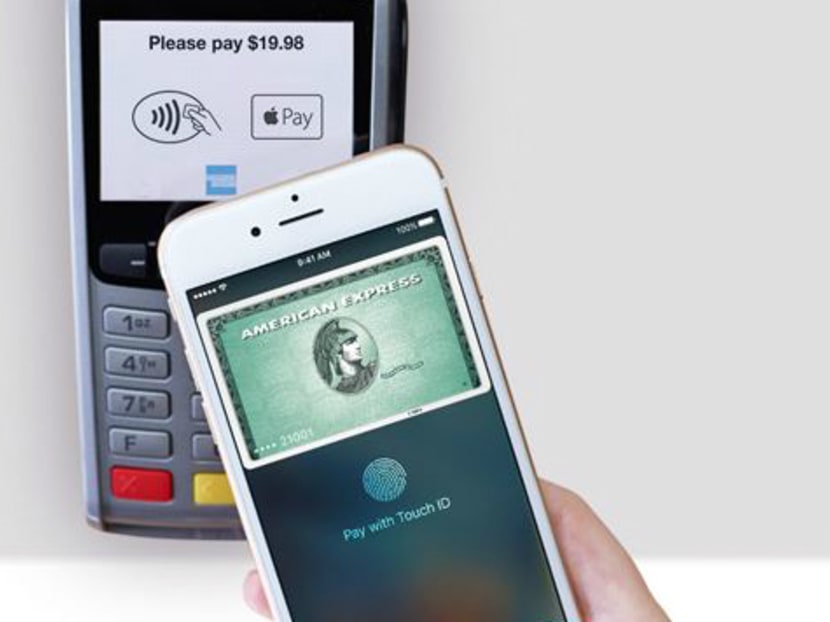Apple Pay launches in Singapore
SINGAPORE — Apple’s mobile payment and digital wallet service, Apple Pay, launched in Singapore on Tuesday (April 19).
SINGAPORE — Apple’s mobile payment and digital wallet service, Apple Pay, launched in Singapore on Tuesday (April 19).
It is, however, only available for American Express card members currently. The service will roll out to DBS, UOB and Standard Chartered credit and debit card holders “in the coming months”, said Ms Jennifer Bailey, Vice-President of Apple Pay. Support for Visa cards is also on the way.
Apple Pay can be used at various retailers, including NTUC FairPrice, Starbucks, Uniqlo, TopShop, Shaw Theaters and Din Tai Fung. Others like BreadTalk, Cold Storage, FoodRepublic, Uber and Giant will also be adding support for Apple Pay soon, Apple’s website said.
To use Apple Pay, consumers first connect their credit or debit cards to a mobile wallet. Users then pay at stores by holding their iPhone, iPad or Apple Watch close to terminals with near field communication (NFC) technology.
Singapore is the sixth country to get the service, after it was launched in the United States in 2014. Apple Pay was released in the United Kingdom in July last year, follow by Canada and Australia in November and China in February this year. The service is expected to roll out in Spain and Hong Kong later this year.
Apple Pay’s launch comes ahead of Android Pay and Samsung Pay, both of which are also expected to launch in Singapore this year. Samsung Pay will have DBS, OCBC Bank and Standard Chartered Bank among its partner companies, as well as American Express, MasterCard and Visa.
There are though somes e-wallets already in the Singapore market. Dash for example was created by Standard Chartered Bank and Singtel, while DBS has its own PayLah! system.
Apple seeks to ensure users’ security and privacy by not storing credit or debit card numbers on the Apple device or servers. Instead, a unique number is assigned and encrypted to the device. When you make a payment through Apple Pay, it is authorised using a one-time security code, instead of using only the safety code on the back of your credit card. Paying through your mobile phone also requires your finger print on the iPhone’s Touch ID sensor.
Amex offers users real-time notifications and details when a purchase is made, plus an enhanced account monitoring and servicing on its Amex Mobile app.
Forrester researcher Zhi Ying Ng cautioned that consumer adoption of Apple Pay “will be slower than expected in Singapore”.
While the use of contactless card payments is increasing in Singapore, she noted that “there are still significant barriers to consumer adoption of digital wallets today”.
“It will take time before these wallets become more convenient for customers and as customers realise the benefits and additional value that digital wallets bring,” she said.
Apple user Joanne Chia, 36, has signed up for Apple Pay and is keen to try the new feature. She told TODAY she was “comfortable” with the security measures on Apple Pay. “With the physical card, there is a constant fear of people getting of our credit card numbers too. At least with (Apple Pay’s) Touch ID, even if we lose our device, the person won’t have our thumbprint.”
Still, Ms Chia added: “In the long run, I will probably only continue to use it depending on how widely rolled out it is with merchants”.
RFi Group reported last year that only 15 per cent of retailers in Singapore accept contactless payments, behind a global average of 20 per cent.
Last month, the Land Transport Authority announced that commuters would be able to tap their smartphones to make payments for all public bus and train fares, but iPhone users were not included as the phones are not compatible with the NFC Contactless e-Purse Application payment platform.
Apple accounts for nearly 38 per cent of the 1.1 million smartphones shipped to Singapore, according to data from market research firm IDC last year.







